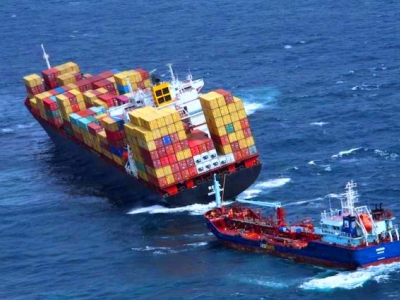Government will fund $2m funding to help improve New Zealands maritime response capability
 Maritime New Zealand (MNZ) welcomes the release of the independent review of its response to the grounding of theRena, and the announcement of $2m of Government funding to help improve New Zealand’s maritime response capability.
Maritime New Zealand (MNZ) welcomes the release of the independent review of its response to the grounding of theRena, and the announcement of $2m of Government funding to help improve New Zealand’s maritime response capability.
The report, by independent reviewer Simon Murdoch, entitled as Independent Review of Maritime New Zealand’s Response to the MV Rena Incident on October 5, 2011 was released yesterday by Transport Minister Gerry Brownlee. In the review report, Mr Murdoch made it clear theRena grounding was unprecedented in its complexity but the response, while flawed in some aspects, had ultimately been effective.
AfterRena hit the Astrolabe Reef on 5 October 2011, hundreds of oil spill responders and 8,000 volunteers removed around 1,000 tonnes of oily waste from the coastline, recovered more than 4,500 tonnes of containers and debris and rescued hundreds of oiled birds. Beaches closed as a result of oil were re-opened from 16 November 2011.
“The reviewer finds the response team overcame initial hurdles to set up a strong and effective team that worked closely with the local community. The response minimised the risks to wildlife and achieved a high quality, world class clean-up,” Mr Manch said. “The generally positive results of theRena Recovery Plan’s scientific monitoring programmesupport this finding.”
Mr Manch said the response team faced a complex scenario involving not only oil recovery, but non-oil pollution from containers and resulting debris, as well as overseeing a difficult salvage operation.
According to the report, the Maritime New Zealand has:
- worked closely with the Ministry of Transport, Department of Prime Minister and Cabinet, and the Environmental Protection Agency to improve inter-agency information-sharing and reporting on maritime response activity.
- undertaken a comprehensive review of the National Response Team (NRT) – a group of trained oil spill responders from around the country who form the core response team for a Tier 3 oil spill incident. The team will have greater resources to support oil spill response and the national oiled wildlife response.
- appointed an exercise leader and additional technical support staff at MNZ’s Maritime Pollution Response Service (MPRS). A logistics manager has also been seconded to MPRS to improve national procurement and supply arrangements.
- reviewed its international support arrangements for oil spill response – both government and specialist commercial support. This includes the Australian Maritime Safety Authority (AMSA) and salvage experts London Offshore Consulting.
- developed additional specialist support arrangements in areas such as well control and hazardous and noxious substances
- initiated discussions with the Department of Conservation aimed at the development of memorandum of understanding to develop a wider response policy framework to address non-oil pollution and natural resource protection in its marine jurisdiction and coastline.
- reviewed the wildlife response contract to ensure better integration of this area of the response into the NRT.
- undertaken training for MNZ staff on the International Oil Pollution Compensation Fund and International Tanker Owners Pollution Federation to improve understanding of how financial claims for oil pollution incidents should be compiled.
- MNZ is currently reviewing the national Oil Spill Response Strategy.
- MNZ is also reviewing its purchasing system to improve financial management during the peak of a response.
|
Rena by the numbers
- At the height of the response, around 800 people were involved in the oil spill response team, including members of the incident command centre (ICC), and beach clean-up and wildlife response teams.
- Around 500 New Zealand Defence Force (NZDF) personnel were involved at the height of the response.
- Around 8,000 volunteers joined the response, contributing more than 19,000 hours to the clean-up.
- Around 150 local businesses and organisations provided support to the response.
- Beach clean-up crews collected more than 1,000 tonnes of oily waste from the coastline.
- A team of about 90 salvors from Svitzer and SMIT were actively engaged in the operation.
- 1,733 tonnes of heavy fuel oil (HFO) on boardRena when it grounded, with around 350 tonnes estimated to have been lost overboard in the first week and further smaller amounts subsequently.
- 1368 containers were listed on the original manifest. Salvors have recovered 1039, with 329 unrecovered, either trapped in inaccessible parts of the wreck or lost to the sea.
- Oiled wildlife treatment and rehabilitation facility set up by The National Oiled Wildlife Response Team, led by Massey University, capable of housing 500 birds.
- 407 birds in care at the facility at the peak of the response,
- A total of 375 little blue penguins cleaned and released in a staged process from 22 November 2011.
- 60 endangered New Zealand dotterels were pre-emptively caught to protect them from oil, and progressively released from 25 November 2011.
- A total of 2030 dead birds collected, of which 1367 were oiled.
(Source: Maritime New Zealand |
|
Learn more information about the Rena grounding and recovery plans by the Maritime New Zealand by clicking at the dedicated Rena Response Page below
Response to theRena grounding
|
 Maritime New Zealand (MNZ) welcomes the release of the independent review of its response to the grounding of theRena, and the announcement of $2m of Government funding to help improve New Zealand’s maritime response capability.
Maritime New Zealand (MNZ) welcomes the release of the independent review of its response to the grounding of theRena, and the announcement of $2m of Government funding to help improve New Zealand’s maritime response capability.


























































